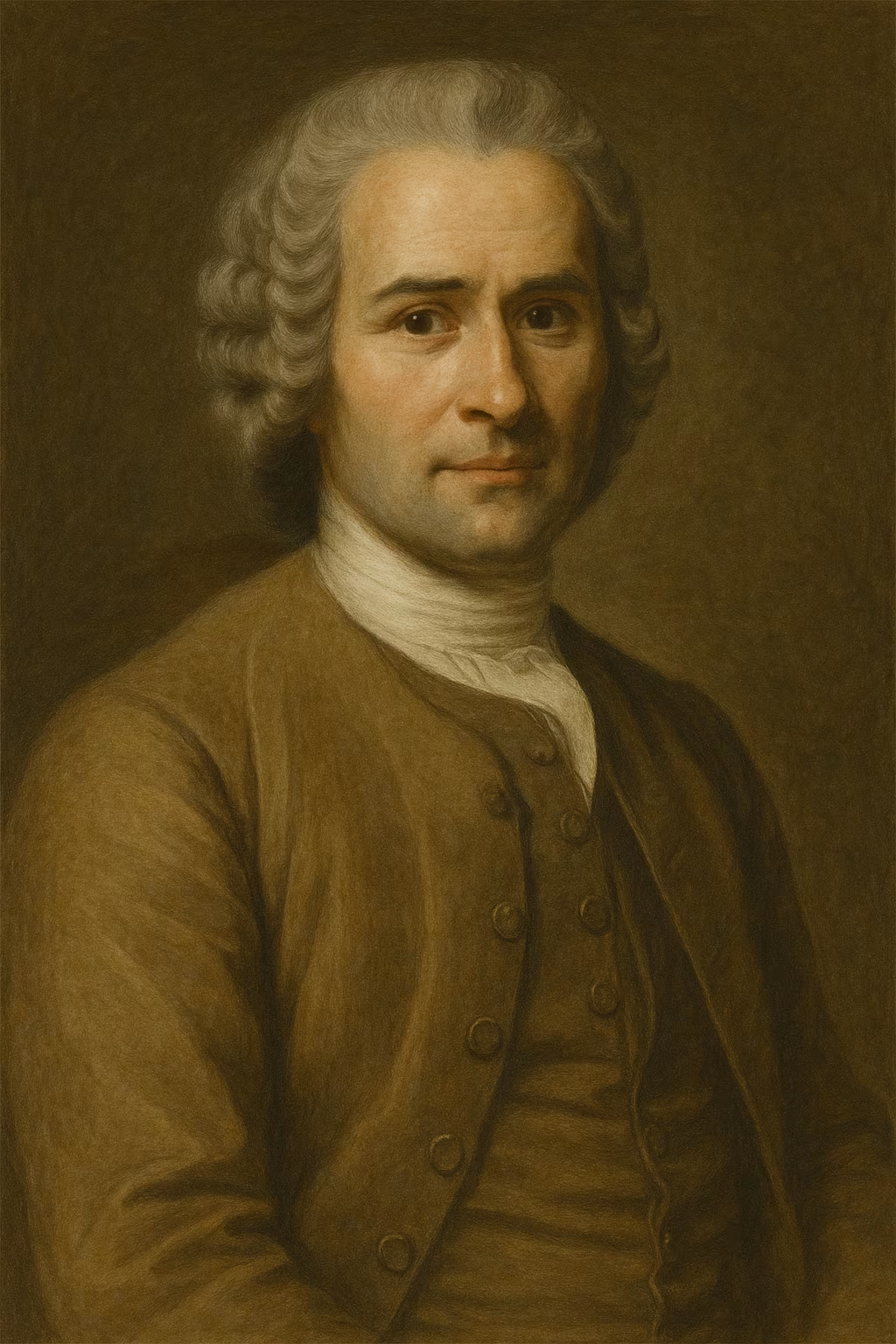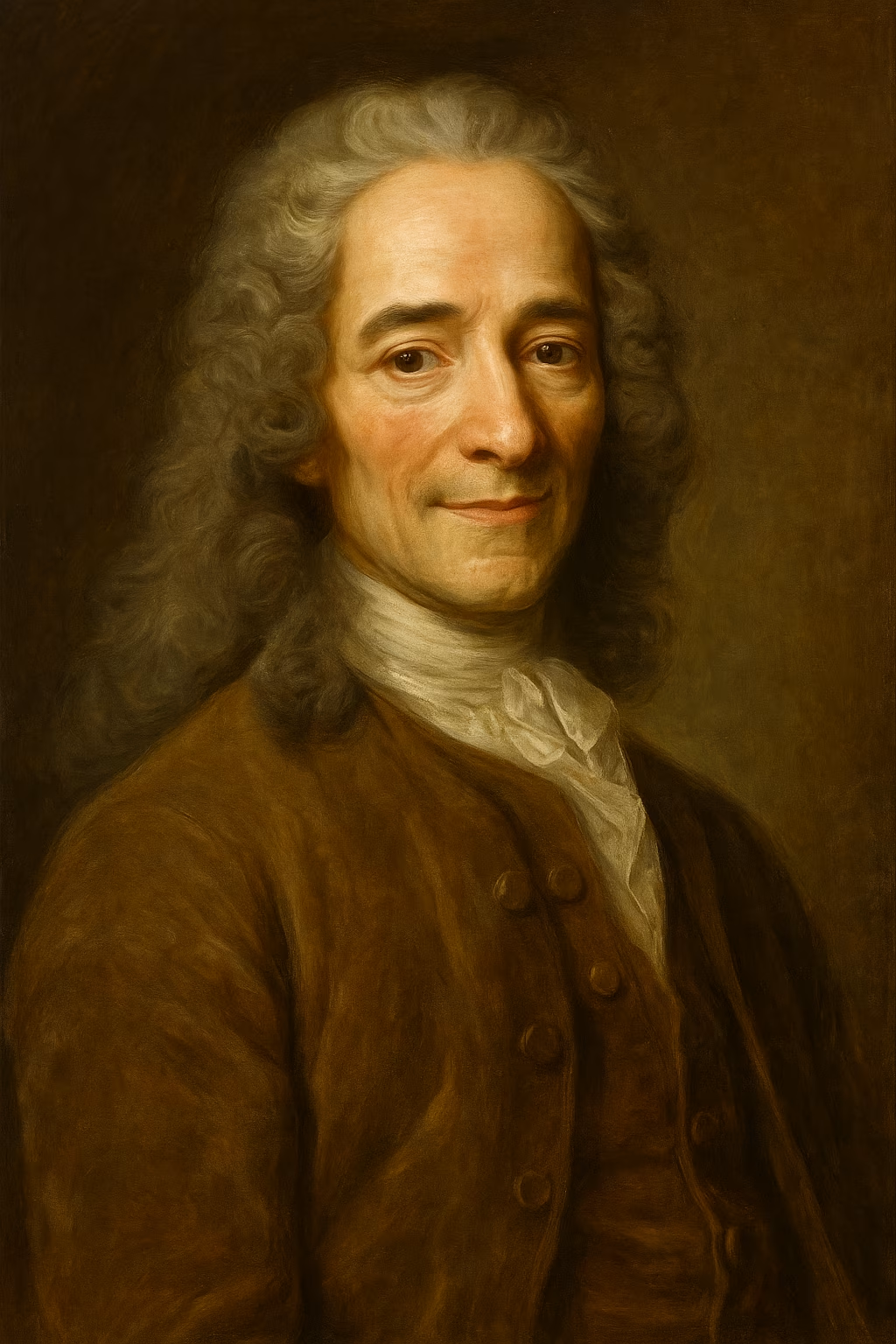Jean-Jacques Rousseau (1712 – 1778)
Quick Summary
Jean-Jacques Rousseau (1712 – 1778) was a philosopher and major figure in history. Born in Geneva, Republic of Geneva, Jean-Jacques Rousseau left a lasting impact through Won the Dijon Academy prize with the Discourse on the Sciences and Arts (1750).

Birth
June 28, 1712 Geneva, Republic of Geneva
Death
July 2, 1778 Ermenonville, Kingdom of France
Nationality
Citizen of Geneva (naturalized French in 1770)
Occupations
Complete Biography
Origins And Childhood
Born to a Genevan watchmaking family, Rousseau lost his mother days after birth and was raised by his father Isaac, whose restless temperament led to frequent moves. Late-night readings of Plutarch and pastoral romances nurtured his passion for antiquity and sentiment. Apprenticed to a notary and then to an engraver, he rejected workshop discipline and in 1728 fled Geneva for Savoy, where he met Madame de Warens. She became his patron, religious guide, and later companion, shaping his musical and literary education during years spent in Annecy, Turin, and Chambéry.
Intellectual Formation
Settling in Lyon and Paris during the 1740s, Rousseau entered literary circles, copied music for a living, and absorbed Enlightenment debates. He contributed musical articles to Diderot’s Encyclopédie, promoted a new system of musical notation, and composed works such as Le Devin du village. Poverty and criticism sharpened his reflections on inequality, luxury, and moral corruption in urban society.
Discourses And Reputation
In 1750 Rousseau won the Dijon Academy prize with the Discourse on the Sciences and Arts, arguing paradoxically that technical progress undermines virtue. The provocative thesis captured Europe’s attention. Five years later, the Discourse on the Origin and Foundations of Inequality among Men contrasted natural liberty with the injustices of civil society, challenging property and domination. These essays established Rousseau as an original and contentious thinker and stirred fierce disputes among philosophers and magistrates.
Paris And Julie
During the 1750s he formed a lifelong partnership with Thérèse Levasseur, with whom he had five children left at the Paris Foundling Hospital—a decision he later lamented. Living at Montmorency, he wrote Julie, or the New Heloise (1761), an epistolary novel celebrating natural virtue and sentiment that became an international bestseller. Woodland walks, friendships with Madame d’Épinay, and quarrels with the Encyclopedists deepened his critique of urban luxury and his ideal of simple rural life.
Swiss And Prussian Exiles
Sheltered at Neuchâtel under Prussian protection, Rousseau endured attacks from local pastors and was driven from Môtiers in 1765. Retreating to Île Saint-Pierre on Lake Biel, he enjoyed a brief idyll and wrote the Letters Written from the Mountain. Expelled again, he accepted David Hume’s invitation to England, but mutual suspicions led to a bitter break. By 1767 he had left Britain and wandered through France under assumed names.
Return To France
With the indulgence of the French court and the patronage of the Prince of Conti, Rousseau obtained permission in 1770 to reside in Paris on the condition that he publish nothing. He resumed copying music, cultivated a small circle of friends, and secretly composed new treatises, including the Dialogues: Rousseau Judge of Jean-Jacques and the Considerations on the Government of Poland, which addressed confederation, civic education, and patriotism.
Confessions And Reveries
From 1764 to 1778 he wrote The Confessions, a groundbreaking autobiography recounting his life through 1765 and claiming unprecedented frankness. The Dialogues and, later, the Reveries of the Solitary Walker continued this introspection, blending meditative walks with reflections on nature, music, and serenity. These works laid the foundations of modern subjectivity, Romantic literature, and early ecological sensibility.
Death And Reception
Invited by the Marquis de Girardin, Rousseau settled at Ermenonville, where he died suddenly on 2 July 1778, likely from a stroke. Portions of The Confessions appeared in print by 1782, and French revolutionaries quickly embraced his political legacy. In 1794 the National Convention transferred his remains to the Panthéon. Nineteenth-century romantics, democrats, and educators developed his ideals of moral equality, civic virtue, and communion with nature, while twentieth-century debates opposed critics of political utopia to advocates of participatory democracy inspired by his thought.
Legacy
Rousseau profoundly shaped modern political philosophy, influencing the French Revolution, republican and socialist traditions, and anticolonial movements. His educational model champions gradual, nature-based development and continues to inspire progressive pedagogy. His autobiographical prose inaugurated an introspective style continued by Romanticism, Symbolism, and psychoanalysis. His reverence for nature and authenticity resonates in contemporary ecological and communitarian theories.
Achievements and Legacy
Major Achievements
- Won the Dijon Academy prize with the Discourse on the Sciences and Arts (1750)
- Formulated a theory of popular sovereignty in The Social Contract (1762)
- Reimagined education with Émile, or On Education (1762)
- Popularized sentimental culture through Julie, or the New Heloise (1761)
- Pioneered modern autobiography with The Confessions and Reveries
Historical Legacy
Rousseau’s writings reshaped modern political thought, laying groundwork for the French Revolution and republican democracies. His ideal of natural education informs progressive pedagogy, while his autobiographical style inspired Romantic literature and quests for authenticity. His appeals to civic virtue, sentiment, and harmony with nature remain touchstones for political theory, literature, and environmental ethics.
Detailed Timeline
Major Events
Birth
Born in Geneva to a family of watchmakers
Flight to Savoy
Leaves Geneva for Annecy and meets Madame de Warens
First Discourse
Wins the Dijon Academy prize and attains European fame
Julie published
Julie, or the New Heloise becomes a bestseller
Émile and Social Contract banned
Authorities order seizure of the books and Rousseau flees
Exile in England
Stays with David Hume before their notorious quarrel
Return to France
Authorized to reside in Paris and resumes music copying
Death
Dies at Ermenonville while a guest of the Girardin family
Panthéon honors
Remains transferred to the Panthéon during the Revolution
Geographic Timeline
Famous Quotes
"Man is born free, and everywhere he is in chains."
"One cannot form a man without making him a citizen."
"I feel my heart and I know men."
External Links
Frequently Asked Questions
When was Jean-Jacques Rousseau born and when did he die?
He was born on 28 June 1712 in Geneva and died on 2 July 1778 at Ermenonville in the Kingdom of France.
Why did Rousseau leave Geneva?
After unhappy apprenticeships and drawn by music, he fled Geneva at sixteen toward Savoy, beginning years of travel through France and Italy before settling in Paris.
Which works made Rousseau famous?
The two Discourses (1750 and 1755), Julie, or the New Heloise, Émile, and The Social Contract secured his European renown.
Why were his books censored?
Civil and religious authorities condemned his doctrines of popular sovereignty and natural religion, ordering the seizure of Émile and The Social Contract in 1762.
What is Rousseau’s legacy today?
His analyses of freedom, civic equality, education, and personal authenticity continue to shape political philosophy, pedagogy, literature, and ecological thought.
Sources and Bibliography
Primary Sources
- Jean-Jacques Rousseau — Du contrat social
- Jean-Jacques Rousseau — Émile ou De l’éducation
- Jean-Jacques Rousseau — Les Confessions
Secondary Sources
- Robert Wokler — Rousseau: A Very Short Introduction ISBN: 9780192801982
- Christopher Bertram — Rousseau and The Social Contract ISBN: 9780415314619
- Leo Damrosch — Jean-Jacques Rousseau: Restless Genius ISBN: 9780151010816
External References
See Also
Related Figures
Specialized Sites
Batailles de France
Discover battles related to this figure
Dynasties Legacy
Coming soonExplore royal and noble lineages
Timeline France
Coming soonVisualize events on the chronological timeline
